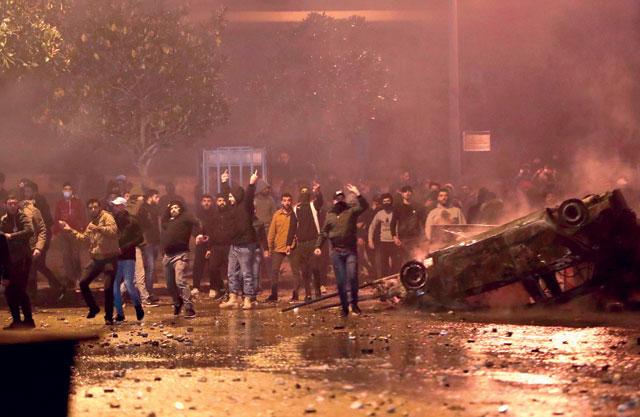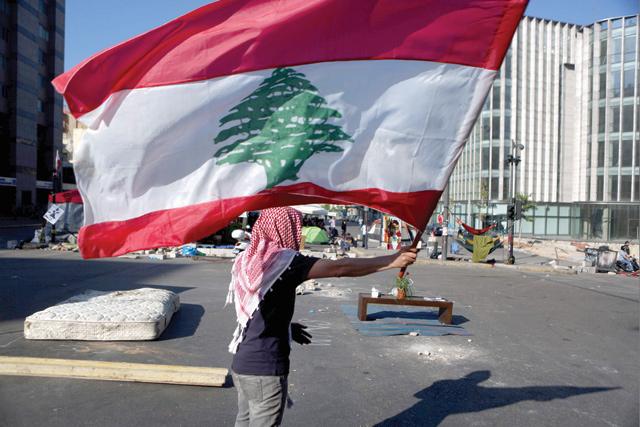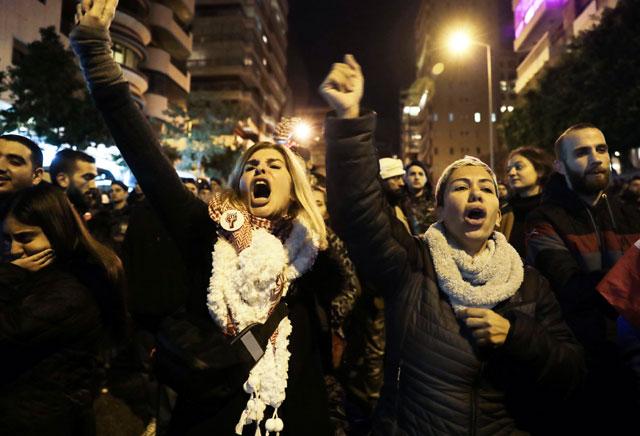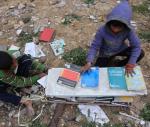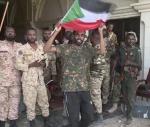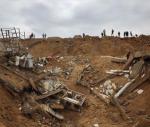You are here
Lebanon ups security at protest sites after violence
By AFP - Dec 18,2019 - Last updated at Dec 18,2019
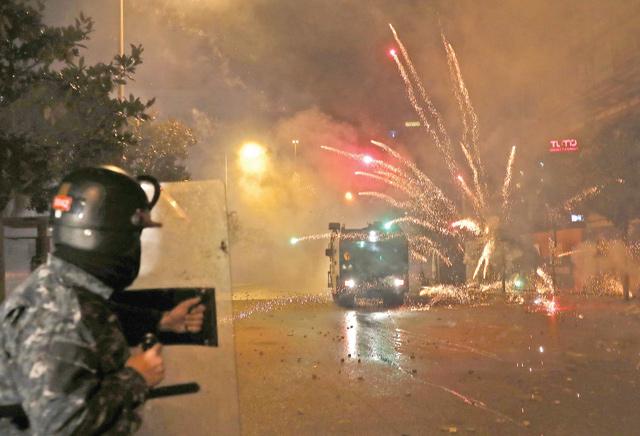
Supporters of Lebanon's Shiite Hizbollah and Amal groups hurl fireworks at security forces late on Tuesday in central Beirut (AFP photo)
BEIRUT — Lebanon increased security around protest centres in central Beirut Wednesday, after several nights of violence disrupted two months of largely peaceful anti-government demonstrations.
Barricades were erected overnight to block or control access to protest sites in the capital where counterdemonstrators have previously tried to attack protesters, AFP journalists said.
An officer who spoke to AFP on condition of anonymity said the concrete barriers were intended to help security forces better control the sites and prevent further clashes.
After violence between protesters and security forces in Beirut on Saturday and Sunday night, and between counterdemonstrators and police on Monday night, the capital remained calm on Tuesday.
But tensions were recorded elsewhere in the country, as Lebanon awaits scheduled parliamentary meetings to name a new premier on Thursday, a required step to form a Cabinet.
Meanwhile, Lebanon's Saad Hariri said Wednesday he would not seek to stay on as prime minister, ahead of much-delayed consultations to give the protest-wracked country a new government.
Fifty days after unprecedented nationwide demonstrations against Lebanon's reviled political elite forced him to step down, the caretaker premier had looked like he might attempt to keep his seat.
But he said his name was drawing too much opposition for him to be a candidate when official consultations to pick a new line-up begin on Thursday.
"I have strived to meet their demand for a government of experts, which I saw as the only option to address the serious social and economic crisis our country faces," Hariri said.
"I announce I will not be a candidate to form the next government," he said in a statement.
Lebanon’s economy has been sliding towards default in recent weeks but the main political parties have so far failed to respond to calls from the street and international partners by forming a credible Cabinet capable of undertaking key reforms.
The consultations for a new Cabinet have been postponed twice already and it remains to be seen whether they will indeed take place on Thursday and whether Hariri’s chances of a third mandate as prime minister are really over.
The 49-year-old, who sports trademark slicked-back hair and a closely cropped beard, was thrust onto the political stage after his father Rafik, himself an ex-premier, was assassinated in a February 2005 car bomb attack.
But he has struggled to fill his father’s shoes, grappling in the latest crisis to address nationwide protests demanding the removal of a political elite viewed as incompetent and corrupt.
Hariri has cast himself as a champion of economic reform held hostage by unwilling coalition partners, but protesters have categorised him as a product of Lebanon’s hereditary politics.The unprecedented protests started on October 17 against a political elite deemed inept and corrupt. Protesters demand a complete overhaul of the ruling class and a new government formed of independent experts.
Prime minister Saad Hariri resigned on October 29, but bitter divisions between political parties have twice seen parliamentary consultations to name a new premier postponed.
On Tuesday night, young supporters of the Shiite Amal movement threw stones at anti-government protesters in the southern Shiite stronghold of Nabatieh, a witness said.
Unknown perpetrators set fire to a Christmas tree in the northern city of Tripoli, an AFP correspondent said.
On Monday night, dozens of supporters of the country’s two main Shiite political parties set fire to cars and clashed with security forces trying to prevent them from reaching Beirut’s main protest square.
Pressure to form a new government is compounded by the near collapse of the economy, already weakened by years of political deadlock and the impact of the eight-year-old war in neighbouring Syria.
The World Bank estimates that Lebanon is in recession, and has warned that the number living in poverty could increase from a third to half the population.
Related Articles
BEIRUT — Dozens of people were wounded in overnight clashes between security forces and supporters of Lebanon's two main Shiite political pa
BEIRUT — The resignation of Lebanon's government under pressure from the street looked set to ease a two-week-old nationwide lockdown but pr
BEIRUT — Dozens of protesters gathered outside the Beirut home of Lebanon's new prime minister on Saturday, calling for Hassan Diab's r


